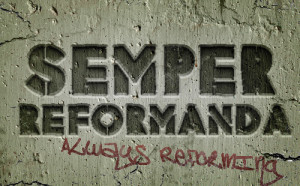 Mike Riccardi, in an article entitled “Semper Reformanda: Christ Will Do Everything, or He Will Do Nothing” writes:
Mike Riccardi, in an article entitled “Semper Reformanda: Christ Will Do Everything, or He Will Do Nothing” writes:
Reformation Day is fast upon us. Next Saturday will be the 498th anniversary of Martin Luther famously nailing his 95 Theses to the Castle Church door in Wittenberg, Germany, and kick-starting the Protestant Reformation as a result. Because of that, there will likely be many posts in the Christian blogosphere celebrating the recovery of the biblical Gospel from the perversions of Roman Catholic theology. And because of that, there will likely be many Romanist sympathizers who chide us Protestants as divisive, overly-narrow, unity-destroying, and judgmental. They’ll say something like this (a comment we’ve received before at The Cripplegate):
This is what drives me nutty about Christianity. We all believe in the Bible, Jesus Christ, the road to salvation and the Resurrection. Do I believe exactly as you do? I’m sure I don’t, but I don’t believe you’re any less Christian than I am. We need to understand that there’s more that unites us than divides us.
The problem, of course, is that Protestants and Catholics don’t all believe the same things about the most foundational aspects of the Christian Gospel. That means that we’re not just other Christians from another “denomination.” When two people disagree on issues as fundamental as the basis and instrument of salvation (i.e., Christ’s righteousness alone imputed through faith alone, versus Christ’s righteousness imparted through faith and our works) and whether good works are part of the ground of our righteousness or merely the evidence——one of them is a Christian and the other isn’t.
We see that proven plainly by the way the Apostle Paul spoke about the Judaizers. The Judaizers were professing Christians who “began teaching the brethren, ‘Unless you are circumcised according to the custom of Moses, you cannot be saved’” (Acts 15:1). In other words, they taught that the righteousness of Christ received by faith alone is not enough to secure your salvation. To be sure, you need to have faith in Jesus; they wouldn’t deny faith in Christ is necessary for salvation. They would just say it was insufficient; instead, you must “complete” your justification by performing certain good deeds. In other words, the Judaizers sought to add personal works of righteousness to the ground of their justification. They were the first-century counterpart to the Roman Catholic Church, which teaches, “If anyone says that the [justification] received is not preserved and . . . increased before God through good works but that those works are merely the fruits and signs of justification obtained, but not the cause of the increase, let him be anathema” (Council of Trent, Session 6, Canon 24). For the Judaizers, those works were circumcision and the other Mosaic ceremonies. For the Catholics, those works are baptism, participation in the Eucharist, and the other sacraments.
Severed from Christ
But notice how Paul speaks of these teachers in the New Testament. He does not count them to be merely misled brothers in Christ. The churches of Galatia hadn’t even become propagators of this doctrine yet; Paul wrote to them while they were simply being tempted to believe in it. And even then Paul writes to them and says, “I fear for you, that perhaps I have labored over you in vain” (Gal 4:11). That is to say, he fears they may not have ever been truly saved (cf. 1 John 2:19).
He goes on to say that if they receive circumcision—that is, if they allow even the smallest of religious rituals to become part of the ground of their confidence for salvation—“Christ will be of no benefit to you” (Gal 5:2). Notice, he does not say, “Christ will be of some benefit to you, just not as much as otherwise. You’ll differ a little doctrinally, but we can still rejoice in our unity.” No. Paul says that everyone who receives circumcision as a ground of their righteousness is obligated to keep the whole law (Gal 5:3). In other words, if you want your righteousness to be based even partly on works, you’re under obligation to earn the whole thing by works (cf. Jas 2:10). And in that case, since you would then be seeking to be justified by law, it would be right to speak of you as “severed from Christ, . . . fallen from grace” (Gal 5:4). You would be one of those whom the Apostle John said “went out from us, but . . . were not really of us” (1 John 2:19).
Finally, Paul speaks about those who preach such a soul-destroying false-gospel. His conclusion regarding such a teacher is: “he will bear his judgment” (Gal 5:10). Again, this is not merely an estranged brother. He is not one of Christ’s sheep, just from another fold. He will bear his judgment. He will face the condemnation of Almighty God that no true believer can ever face (cf. Rom 8:1). Continue reading →
 Dr. Sam Storms has written a series of articles which be reconciled to God and made acceptable in his sight?”
Dr. Sam Storms has written a series of articles which be reconciled to God and made acceptable in his sight?”

